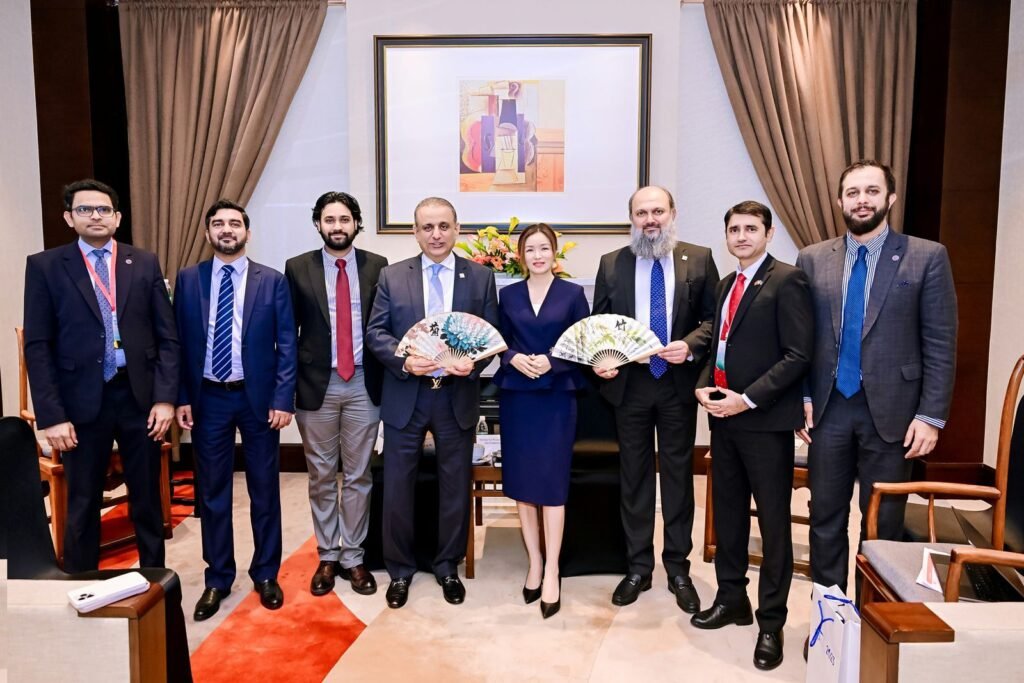Shenzhen, 7 June 2024 (TDI): The Pakistan-China Business Forum, a key event enhancing trade and investment ties between the two nations, concluded successfully.
The forum was marked by significant participation from business leaders and government officials from both countries, fostering collaboration and mutual growth.
The event began with an inaugural session where Prime Minister Shehbaz Sharif addressed a gathering of businessmen from Pakistan and China, along with leadership from the Shenzhen Government.

Following the inaugural session, B2B meetings commenced:
The Pakistani delegation included representatives from 14 sectors, comprising 105 businesses, while the Chinese side had over 500 businesses.
These interactions led to more than 1000 B2B sessions, providing a platform for exploring potential partnerships and investment opportunities.
On the sidelines, Federal Minister for Commerce Jam Kamal Khan and the Minister for Privatisation and Investment held meetings with over 40 Chinese enterprises.
They actively encouraged Chinese investment in various Pakistani sectors, to bolster economic cooperation.
Minister Jam Kamal Khan also engaged with Chinese delegations from Xinjiang, Qingdao, and Weifang.
Moreover, He underscored the significance of the conference in strengthening bilateral business relations.
“The presence of Pakistani and Chinese businesses at this forum is a testament to our strong bilateral relations,” he said.
“Chinese businesses have set a global benchmark, and we aim to learn from their experiences to build a robust economic partnership,” he added.
In his discussions, Khan highlighted the vital role of industry and business in driving economic growth.

He pointed out that the forum was organized to learn from the Chinese companies’ success and to work towards a shared goal of a strong, economically vibrant Pakistan.
Jam shared insights into the trade dynamics between Pakistan and China. In 2023, bilateral trade reached USD 20.7 billion, driven by a 25% decline in Pakistan’s imports from China to USD 17.3 billion, and a 1.4% increase in Pakistan’s exports to China, totaling USD 3.46 billion.
He emphasized the potential for expanding this trade portfolio and stressed that events like this forum could yield positive outcomes through collaboration.
Addressing Pakistani businesses, Jam Kamal Khan emphasized the need for a clear path to economic recovery. “Our government’s foremost priority is economic recovery through increased trade and investment,” he said. “Under Prime Minister Shehbaz Sharif’s leadership, we are witnessing positive results from our efforts in economic stability, security, and governance.”
Jam’s discussions with delegations from Speedaf Logistics Company and China Metallurgical Group Corporation (MCC Group) highlighted the multifaceted ventures of large Chinese business groups.
He welcomed Chinese companies to establish joint ventures (JVs) with Pakistani businesses, leveraging Pakistan’s market for global exports.
Jam Kamal assured Chinese companies of full support from his office, stating, “We are here to facilitate your investments and partnerships. I am committed to visiting China again or hosting you in Pakistan to ensure our mutual success.”
During his visit, Khan witnessed the signing of 30 Memoranda of Understanding (MoUs) and one Letter of Intent (LOI) with Chinese companies.
Federal Ministers Abdul Aleem Khan (Board of Investment) and Rana Tanveer Hussain (Industries) also participated, underscoring the government’s commitment to fostering bilateral cooperation.
Also Read: Pak-China Business Forum boosts trade, signs 32 MOUs
A landmark MoU was also signed between Hualu Engineering & Technology Co., Ltd., and Asiapak Investments Limited to produce competitively priced urea in Pakistan. This agreement aims to boost public finances and reduce reliance on imports.
The forum identified 14 priority sectors for attracting investment in Pakistan, based on which the business conference was jointly organized by the Ministry of Commerce, Board of Investment, Ministry of IT, Ministry of Food Security, Trade Development Authority of Pakistan, and the Planning Division.
These sectors include:
1. Large-scale base metals refining units, especially copper deep refining
2. Solar cells and modules manufacturing
3. Full-scale naphtha cracker facilities and oil refining complex
4. Large-scale synthetic yarn and fabric production
5. Iron and steel articles complex
6. Cell phone manufacturing with more value addition in Pakistan
7. Labour-intensive sectors like textile, leather products, pharmaceuticals, chemicals, medical equipment, footwear, and toys
8. Agriculture food parks
9. Electric vehicles
10. Electronics, laptops, and home appliances manufacturing
11. Urea and fertilizer production using Thar coal gasification
12. Semi-conductor manufacturing
13. Information and Communications Technology (ICT)
The Pakistan-China Business Forum 2024 is a milestone in strengthening economic ties between the two nations. The event underscored the potential for mutual growth and the commitment of both governments to fostering a conducive environment for trade and investment.
Established in December 2008, The Diplomatic Insight is Pakistan’s premier diplomacy and foreign affairs magazine, available in both digital and print formats.















